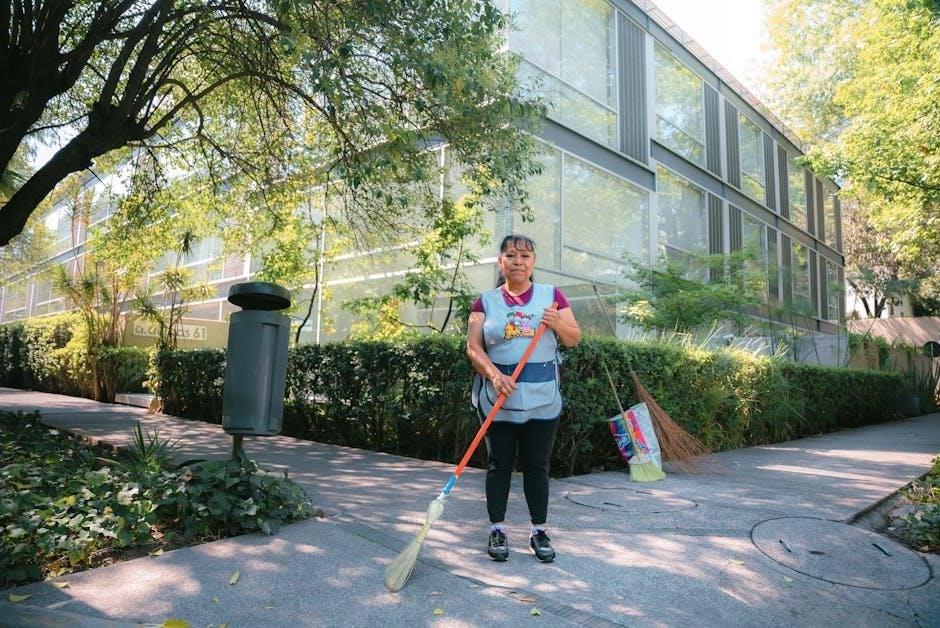The Gardening and Landscaping Services Award 2023 governs employment conditions, wages, allowances, and entitlements for industry workers, ensuring fair pay and compliance with Australian labor standards.
1.1 Overview of the Award
The Gardening and Landscaping Services Award 2023 provides a comprehensive framework for employment conditions in the industry. It outlines minimum pay rates, allowances, penalty rates, and leave entitlements for employees. The award ensures fair compensation and compliance with Australian labor laws. Effective from 1 July 2023, it applies to employers and employees in gardening and landscaping services, including labor hire businesses. The award also covers classifications, overtime, and working hours, ensuring transparency and equity in workplace practices. Employers must adhere to these guidelines to maintain compliance and provide fair treatment to all staff members.
1.2 Scope and Coverage
The Gardening and Landscaping Services Award 2023 applies to employers and employees in the gardening and landscaping industry. It covers businesses providing services like plant care, landscape maintenance, and garden construction. The award also extends to labor hire businesses and their employees placed in this industry. However, it excludes certain employers, such as local government councils, golf clubs, and others specified in the award. The scope ensures fair employment conditions for gardeners, landscapers, and related roles, promoting industry-wide compliance with minimum standards. This includes full-time, part-time, and casual employees, ensuring equitable treatment across all employment types.
1.3 Importance of the Award in the Industry
The Gardening and Landscaping Services Award 2023 is crucial for establishing fair wages and employment standards. It ensures workers receive appropriate pay rates, allowances, and penalties, maintaining industry equity. By setting clear guidelines, the award fosters transparency and compliance, benefiting both employers and employees. It also addresses modern challenges, such as casual employment and overtime, ensuring all workers are protected. This award is vital for the industry’s growth and stability, promoting a balanced and productive workforce. Its provisions are regularly updated to reflect economic changes, ensuring relevance and fairness in the evolving landscape sector.

Classification Levels and Minimum Rates of Pay
The award outlines classification levels and minimum pay rates, ensuring fair compensation based on roles and responsibilities, with annual updates to reflect economic changes and industry standards.
2.1 Classification Structure
The Gardening and Landscaping Services Award 2023 establishes a clear classification structure, categorizing employees based on their roles, skills, and responsibilities. This system ensures that workers are fairly compensated according to their job requirements. The structure includes various levels, from entry-level positions to highly skilled tradespersons, each with defined duties and corresponding pay rates. Employers must classify employees accurately to ensure compliance with the award’s provisions. This structure promotes transparency and equity, helping employers and employees understand their obligations and entitlements within the industry.
2.2 Minimum Weekly Rates (Full-Time Employees)
The Gardening and Landscaping Services Award 2023 sets minimum weekly rates for full-time employees, effective from the first full pay period on or after 1 July 2023. These rates are determined based on the employee’s classification level and reflect the 5.75% increase from the Annual Wage Review. Full-time employees are entitled to a 38-hour workweek, with rates varying according to their role, from entry-level positions to skilled tradespersons. Employers must adhere to these rates to ensure compliance with the award’s requirements. For detailed rate information, refer to the Fair Work Ombudsman’s official resources.
2.3 Minimum Hourly Rates
The Gardening and Landscaping Services Award 2023 outlines minimum hourly rates for employees, effective from the first full pay period on or after 1 July 2023. These rates are calculated based on the employee’s classification level and the 38-hour workweek standard. Hourly rates are derived from the minimum weekly rates, ensuring fair compensation for part-time and casual employees. Casual employees receive an additional loading on their base hourly rate. Employers must ensure compliance with these rates to avoid underpayment, reflecting the 5.75% increase from the Annual Wage Review. For specific details, refer to the Fair Work Ombudsman’s official guidelines.

2.4 How Pay Rates Are Determined
Pay rates under the Gardening and Landscaping Services Award 2023 are determined by the Fair Work Commission, considering factors like job roles, experience, and industry standards. The Commission reviews and adjusts rates annually through the Annual Wage Review process, ensuring fair compensation aligned with economic conditions. Rates are structured based on classifications, with higher levels reflecting greater skill or responsibility. Employers must adhere to these rates, which are published in the Award and updated from 1 July each year. Casual employees receive additional loadings on their base rates, ensuring compliance with labor laws and maintaining equity across employment types.

Allowances and Penalty Rates
The Award includes various allowances for tools, travel, and accommodation, while penalty rates apply for overtime and public holidays, ensuring fair compensation for specific work conditions.
3.1 Types of Allowances

The Gardening and Landscaping Services Award 2023 outlines several types of allowances, including tool, equipment, and travel allowances. Tool allowances compensate employees for using personal tools, while equipment allowances cover machinery use. Travel allowances reimburse expenses for work-related journeys, such as fares and accommodation. Additionally, leading hand allowances are provided for employees supervising others, with rates increasing based on team size. These allowances aim to offset work-related expenses and recognize additional responsibilities, ensuring fair compensation beyond base pay rates.
3.2 Leading Hand Allowances

Leading hand allowances are paid to employees who supervise others, with rates varying based on the number of workers under their charge. For 1-2 employees, the allowance is £0.52 per hour, up to a maximum of £19.90 per week. For 3-6 employees, the rate increases, and for 7-9 employees, it rises further. Employees supervising 10 or more workers receive the highest allowance. These payments recognize the additional responsibilities of leading hands and are paid in addition to the base rate of pay. The allowances do not apply during overtime periods, as overtime rates already account for extra duties.
3.3 Tool and Equipment Allowances
Tool and equipment allowances reimburse employees for the use of their personal tools and equipment in the workplace. Employees are entitled to a tool allowance of $0.52 per hour, capped at $19.90 per week. This allowance applies to tradespersons classified at Level 4 or 5. The payment recognizes the cost of maintaining and using personal tools necessary for their duties. Employers must reimburse employees for the demonstrable cost of special clothing and equipment required for the job. This allowance is paid in addition to the base rate of pay and does not apply during overtime periods, as overtime rates already include tool usage costs.
3.4 Travel and Accommodation Allowances
Travel and accommodation allowances compensate employees for expenses incurred while working away from their usual workplace. Employees receive reimbursement for fares exceeding normal commuting costs and payment at the minimum hourly rate for additional travel time. For overnight stays, board and lodging costs are reimbursed, with payment for lodging based on demonstrable expenses. Travel time allowance covers up to 8 hours in any 24-hour period, ensuring fair compensation for time spent commuting to remote work locations. These allowances aim to offset the financial burden of work-related travel, ensuring employees are not out of pocket for job-related expenses.
3.5 Penalty Rates for Overtime and Public Holidays
Penalty rates apply for overtime and public holidays, ensuring employees receive higher pay for work outside standard hours. Overtime is paid at 1.5 times the ordinary rate for the first two hours and double thereafter. Public holidays attract a minimum of double the ordinary rate. Casual employees receive additional casual loading on these rates. These penalties compensate employees for working during less desirable times, ensuring fair compensation for additional or unscheduled work. The award specifies these rates to maintain equitable pay practices across the industry, reflecting the premium nature of such work arrangements. Compliance with these rates is essential for employers to meet legal obligations.
Overtime and Working Hours
Overtime is defined as work exceeding standard hours, with specific rates applying. Ordinary hours are capped at 38 per week, and overtime calculations are based on hourly rates. Employers must adhere to these limits to ensure compliance with the award’s provisions, balancing workforce needs with employee well-being and legal requirements.
4.1 Overtime Definitions and Calculations
Overtime is defined as work performed beyond the standard 38-hour workweek or outside ordinary hours. Calculations are based on hourly rates, with overtime rates applying as follows: 1.5 times the hourly rate for the first two hours of overtime on weekdays, and 2 times the rate thereafter. Weekend overtime is 2 times the rate, and public holiday overtime is 2.5 times the rate. Overtime is calculated incrementally, ensuring employees are fairly compensated for extended work periods. These provisions apply to full-time, part-time, and casual employees, promoting equitable treatment across the workforce.
4.2 Ordinary Hours of Work
Ordinary hours of work are defined as up to 38 hours per week for full-time employees, with a maximum of 8 hours per day. These hours are typically spread between 6:00 AM and 6:00 PM, Monday to Friday. Employees are entitled to a 30-minute unpaid meal break after working 4 hours consecutively. Ordinary hours exclude overtime and are the standard working period for which employees receive their base rate of pay. Variations to these hours must be agreed upon in writing, ensuring compliance with the award and fair treatment of all workers in the gardening and landscaping industry.
4.3 Breaks and Rest Periods
Employees are entitled to a 30-minute unpaid meal break after working 4 consecutive hours. Paid rest periods of 10-15 minutes are provided for every 4 hours of work. Breaks must be taken within the ordinary hours of work and cannot be accrued or forfeited. If an employee is required to work beyond their ordinary hours without a break, overtime rates apply. Employers must ensure breaks are provided as per the award to maintain compliance and fair treatment of workers in the gardening and landscaping industry.
Leave Entitlements
Annual leave, public holidays, and sick leave are covered under the award, ensuring employees receive fair entitlements aligned with the National Employment Standards and industry-specific conditions.
5.1 Annual Leave and Loading
Employees under the Gardening and Landscaping Services Award are entitled to annual leave based on their normal hours of work, excluding overtime. Payments are made at the employee’s regular rate, with an additional 17.5% loading applied to the minimum hourly rate as specified in the award. This loading is designed to reflect the benefits of paid leave. Annual leave must be paid out before commencing leave unless otherwise agreed in writing. The award ensures fair compensation for time off, aligning with the National Employment Standards and promoting work-life balance for industry workers.
5.2 Public Holiday Entitlements
Employees under the Gardening and Landscaping Services Award are entitled to paid public holidays as outlined in the National Employment Standards (NES). On a public holiday, employees are entitled to their base rate of pay or, if not required to work, an additional day of leave. Penalty rates apply for work performed on public holidays, ensuring fair compensation for employees. The award aligns with NES provisions to ensure consistent and fair entitlements, providing clarity for both employers and employees regarding public holiday pay and leave arrangements.
5.3 Sick Leave and Carer’s Leave
Employees under the Gardening and Landscaping Services Award are entitled to 10 days of paid sick leave per year. Carer’s leave allows employees to care for immediate family members, with up to two days of unpaid leave available. If sick leave is exhausted, unpaid carer’s leave can be accessed. Employees must provide reasonable notice and medical evidence if required. Employers must comply with these provisions, ensuring fair access to leave entitlements, aligning with the NES and promoting work-life balance for employees in the industry.
5.4 Other Leave Provisions
Beyond sick and carer’s leave, employees may access other leave entitlements under the Award. Bereavement leave provides up to two days off for funeral or memorial services. Jury service leave ensures employees are not disadvantaged financially when summoned. Compassionate leave is available for family emergencies. Community service leave supports volunteering or emergency services work. These provisions aim to balance work and personal responsibilities, ensuring employees can address personal matters without penalty, in line with the NES and industry standards.

Apprentices and Trainees
This section outlines the employment conditions, pay rates, and training entitlements for apprentices and trainees in the gardening and landscaping industry, ensuring fair and structured development.
6.1 Apprentice Rates and Conditions
Apprentice rates are structured to increase progressively, reflecting skill development and experience. The Award specifies minimum weekly rates for full-time apprentices, ensuring fair compensation and compliance. Hourly rates are derived from these weekly amounts, providing clarity for part-time arrangements. Conditions include entitlements to training reimbursement, tool allowances, and leave provisions. Employers must maintain accurate records of apprentices’ progress and pay, adhering to Fair Work standards. These rates and conditions aim to support apprentices’ growth while ensuring employers meet legal obligations, fostering a skilled and equitable workforce in the industry.
6.2 Training Fees and Reimbursement
The Gardening and Landscaping Services Award 2023 requires employers to reimburse apprentices for prescribed training fees and textbook costs. Reimbursement also applies to reasonable travel expenses incurred while attending training. Employers must cover excess fares beyond normal commuting costs and provide payment for travel time at the minimum hourly rate. A maximum limit of 8 hours per day applies for travel time reimbursement. These provisions ensure apprentices receive necessary support for their vocational development without financial hardship. Employers are obligated to maintain records of all reimbursements to comply with the Award’s requirements. This support is crucial for fostering skilled professionals in the industry.
6.3 Apprentice Leave Entitlements
Apprentices under the Gardening and Landscaping Services Award 2023 are entitled to leave in accordance with the National Employment Standards. This includes annual leave, sick leave, and public holidays. Employers must provide paid leave for apprentices consistent with full-time or part-time employment conditions. Apprentices are also entitled to unpaid leave for training purposes, ensuring they can attend off-the-job training without loss of pay. These entitlements aim to balance work and training, promoting fair treatment and career development for apprentices in the industry. Employers must ensure compliance with these provisions to support apprentices effectively.

Casual Employment
Casual employment under the Gardening and Landscaping Services Award offers flexibility for employers and employees, with specific entitlements and conditions to ensure fair treatment and compliance with labor laws.
7.1 Casual Loading Rates
Casual loading rates under the Gardening and Landscaping Services Award are designed to compensate casual employees for the lack of permanent employment benefits. As of July 2023, casual loading increased to 25%, reflecting updates in the modern award. This rate is applied to the ordinary hourly rate of pay, ensuring casual employees receive a premium for their flexible work arrangements. The increase aligns with Fair Work Commission rulings, aiming to provide clarity and fairness for both employers and casual workers in the industry.
7.2 Casual Employee Entitlements
Casual employees under the Gardening and Landscaping Services Award are entitled to specific benefits despite their non-permanent status. They receive a 25% casual loading on their hourly rates, up from previous levels, as of July 2023. Additionally, casuals are entitled to payment for overtime, public holidays, and travel allowances under the award. They also have access to leave entitlements, such as unpaid sick and carer’s leave, aligning with the National Employment Standards. These provisions ensure fair treatment and compensation for casual workers, reflecting the industry’s commitment to equity and compliance with labor laws.
7.3 Conversion of Casual to Permanent Employment
Casual employees in the gardening and landscaping industry may be eligible for conversion to permanent employment after meeting specific criteria. If a casual worker has been employed regularly for 12 months, the employer must offer them a permanent position unless there are genuine operational reasons not to. This requirement ensures stability for long-term casuals, aligning with Fair Work regulations. Employers must provide written notice of the offer, and employees have the right to accept or decline. This provision promotes job security and fair treatment for casual workers in the industry, fostering a more stable workforce. Compliance with this rule is mandatory under the award.

Compliance and Record-Keeping
Employers must ensure compliance with award requirements, maintain accurate payroll records, and prepare for Fair Work inspections. Proper record-keeping is essential for audits and demonstrating adherence to regulations.
8.1 Employer Obligations
Employers must adhere to the Gardening and Landscaping Services Award 2023, ensuring compliance with minimum pay rates, allowances, and penalty rates. They are required to maintain accurate records of employees’ hours, wages, and leave entitlements. Employers must also provide payslips to employees, detailing all payments and deductions. Compliance with Fair Work laws is mandatory, and employers must be prepared for audits by the Fair Work Ombudsman. Failure to meet these obligations may result in penalties. Employers are also responsible for ensuring all workplace policies align with the award provisions and National Employment Standards.
8.2 Payroll and Record-Keeping Requirements
Employers must maintain accurate and detailed payroll records, including hours worked, pay rates, allowances, and leave balances. Records must be kept for seven years and be easily accessible for audits. Payroll systems should be configured to automatically calculate entitlements, such as overtime and penalty rates, ensuring compliance with the award. Employers are also required to provide employees with payslips within one working day of payment, detailing all earnings and deductions. Accurate record-keeping ensures transparency and demonstrates compliance with Fair Work regulations and the Gardening and Landscaping Services Award 2023 provisions.
8.3 Fair Work Inspections and Audits
Fair Work Inspections ensure compliance with the Gardening and Landscaping Services Award 2023. Inspectors review pay records, allowances, and rosters to verify adherence to minimum wage rates, penalty rates, and entitlements. Employers must provide accurate documentation upon request, including payslips and time sheets.
Non-compliance can result in penalties, emphasizing the importance of proactive preparation. Employers should regularly audit their own records to identify and address discrepancies, ensuring transparency and adherence to Fair Work standards. This proactive approach mitigates risks and fosters a culture of compliance within the organization.
Industry Trends and Market Analysis
The landscaping industry is growing due to increased consumer spending on home improvements and outdoor spaces. Emerging technologies and sustainability trends are shaping wage dynamics and employment opportunities.
9.1 Growth of the Landscaping Industry
The landscaping industry has seen significant growth, driven by increased consumer spending on outdoor spaces and home improvements. This expansion has led to higher demand for skilled workers, influencing wage rates and employment opportunities. Additionally, trends like vertical gardens and sustainable practices are boosting market demand. As a result, businesses are investing more in landscaping services, creating a positive outlook for industry professionals. This growth is expected to continue, supported by economic recovery and a focus on aesthetics and environmental consciousness in both residential and commercial sectors.
9.2 Factors Influencing Wages and Employment
Economic conditions, labor shortages, and market demand significantly influence wages and employment in the landscaping industry. With rising demand for outdoor improvements, employers often increase pay to attract skilled workers. Labor costs, driven by shortages in specialized trades, also contribute to higher wages. Market trends, such as sustainable landscaping and vertical gardens, further shape employment opportunities. Additionally, consumer spending on home renovations and commercial projects impacts industry growth, creating a dynamic environment for wage adjustments and job creation. These factors underscore the industry’s responsiveness to broader economic and societal trends.
9.3 Emerging Technologies in Landscaping
Emerging technologies like vertical gardens, robotic mowers, and drone-based monitoring are transforming the landscaping industry. Smart irrigation systems optimize water usage, while software tools streamline design and project management. These innovations enhance efficiency, reduce labor costs, and enable sustainable practices. As technology adoption grows, it influences service delivery, productivity, and skill requirements for workers, shaping the future of the industry; These advancements not only improve outcomes but also create new opportunities for professionals to specialize in tech-driven landscaping solutions, ensuring the industry remains competitive and innovative in a rapidly evolving market landscape.
The Gardening and Landscaping Services Award 2023 ensures fair pay and compliance, safeguarding workers’ rights while fostering industry growth and adherence to modern labor standards.
10.1 Key Takeaways
The Gardening and Landscaping Services Award 2023 is essential for understanding employment conditions, pay rates, and entitlements in the industry. It ensures compliance with Fair Work standards, providing clarity on classifications, allowances, and penalty rates. Employers must adhere to minimum pay rates, which are reviewed annually. The award also outlines leave entitlements, overtime rules, and specific provisions for apprentices and casual employees. Staying informed about these guidelines is crucial for both employers and employees to maintain fair workplace practices and avoid non-compliance issues.
10.2 Future Outlook for the Industry
The gardening and landscaping industry is expected to grow, driven by increasing demand for outdoor spaces and eco-friendly designs. Emerging technologies, such as vertical gardens and smart landscaping tools, will shape future practices. Consumer spending on home improvements and a focus on sustainability will further boost the sector. However, competition and wage pressures may challenge smaller operators. Staying updated on award changes and investing in skilled labor will be crucial for businesses to thrive in this evolving market.

10;3 Final Thoughts on Compliance and Best Practices
Compliance with the Gardening and Landscaping Services Award is non-negotiable for employers. Staying updated on award changes ensures fair wages and entitlements. Implementing robust payroll systems and maintaining accurate records are critical. Employers must adhere to Fair Work standards, including overtime, leave, and allowances. Best practices include fostering transparent communication and providing training on award obligations. By prioritizing compliance, businesses can avoid legal risks and build trust with employees, ultimately contributing to a positive and productive work environment.

Leave a Reply